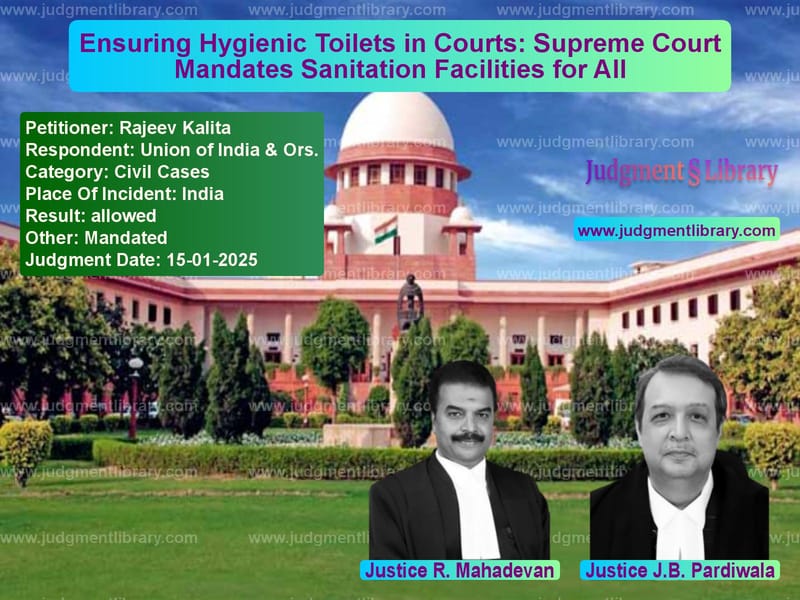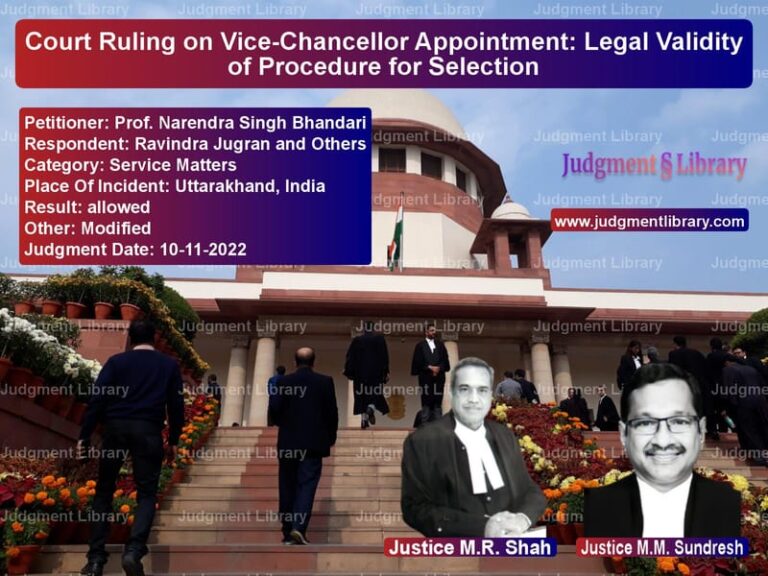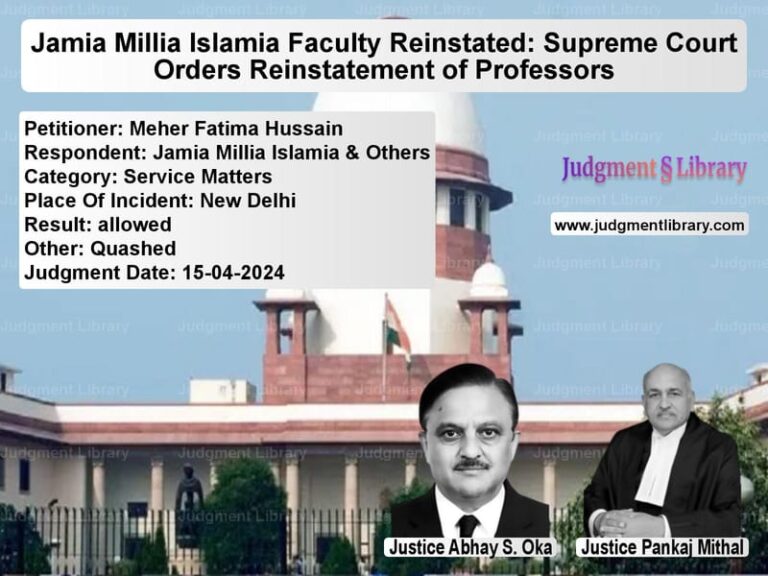Ensuring Hygienic Toilets in Courts: Supreme Court Mandates Sanitation Facilities for All
The Supreme Court of India, in a landmark judgment, addressed a fundamental issue that affects the dignity and well-being of individuals who visit and work in courts across the country. The case Rajeev Kalita vs. Union of India & Ors. involved a writ petition seeking improved sanitation facilities in court premises, emphasizing the need for clean and accessible toilets for men, women, transgender persons, and differently-abled individuals.
The petitioner, a practicing advocate, argued that the absence of basic toilet facilities in courts violated the fundamental right to life and dignity under Article 21 of the Constitution of India. The petition sought a directive from the Supreme Court mandating all States and Union Territories to provide and maintain hygienic toilets in all courts and tribunals.
Background of the Case
The petitioner contended that:
- Basic hygiene is an essential part of the right to live with dignity under Article 21.
- Many court complexes lack proper toilet facilities, forcing litigants, lawyers, and staff to endure unsanitary conditions.
- The lack of sanitation particularly affects women, transgender persons, and persons with disabilities.
- Existing toilets, where available, are often in a dilapidated condition due to inadequate maintenance.
The Supreme Court took cognizance of the issue and directed all High Courts to submit affidavits detailing the availability and condition of toilet facilities in their respective jurisdictions.
Legal Provisions and Government Initiatives
The case was analyzed in light of constitutional provisions and international commitments:
- Article 21: Protection of life and personal liberty.
- Article 47: Duty of the State to improve public health.
- Article 48A: Protection and improvement of the environment.
- Transgender Persons (Protection of Rights) Act, 2019: Prohibits discrimination against transgender individuals in accessing public services.
- Swachh Bharat Mission (SBM): A government initiative aimed at promoting cleanliness, including sanitation in public spaces.
The Supreme Court also considered global best practices, highlighting policies from countries such as the United Kingdom, Australia, Japan, and Canada, where inclusive and well-maintained public toilets are prioritized.
Supreme Court’s Observations
The Court emphasized the importance of clean and accessible toilets in courts, making the following key observations:
- The absence of adequate sanitation facilities in courts violates the dignity of individuals, particularly women, transgender persons, and persons with disabilities.
- Basic hygiene is not a privilege but a necessity, and courts should set an example by ensuring well-maintained facilities.
- Separate toilets should be provided for men, women, transgender persons, and differently-abled individuals.
- All courts must ensure regular maintenance and cleaning of toilet facilities.
- Sanitary napkin dispensers should be installed in women’s toilets.
- A grievance redressal mechanism should be implemented for addressing complaints regarding sanitation.
Final Directions by the Supreme Court
The Supreme Court issued the following directives to all High Courts and State Governments:
- Ensure the construction of separate toilets for men, women, transgender persons, and differently-abled individuals in all court complexes.
- Set up committees in all High Courts to oversee the implementation and maintenance of sanitation facilities.
- Ensure that toilets are accessible, hygienic, and equipped with proper water supply, lighting, and waste disposal facilities.
- Outsource toilet maintenance to professional cleaning agencies to ensure high standards of hygiene.
- Implement a monitoring system to conduct periodic inspections and address maintenance issues.
- Ensure proper signage and facilities such as ramps for persons with disabilities.
- Allocate sufficient budgetary resources for the construction and upkeep of toilets in courts.
- Install sanitary napkin dispensers and disposal mechanisms in women’s restrooms.
- Submit a compliance report within four months detailing the progress made in implementing these directives.
Impact of the Judgment
This judgment sets a crucial precedent for ensuring hygienic conditions in courts. It reinforces the idea that the judiciary must lead by example in upholding basic human rights. By mandating proper sanitation facilities, the Supreme Court has taken a significant step toward improving the working conditions of litigants, lawyers, and court staff.
With the Court’s intervention, it is expected that State Governments and High Courts will take necessary measures to provide and maintain hygienic toilet facilities in all court premises across India.
This ruling underscores that access to clean toilets is not a luxury but a fundamental necessity, ensuring that individuals can access justice with dignity and without undue hardship.
Petitioner Name: Rajeev Kalita.Respondent Name: Union of India & Ors..Judgment By: Justice R. Mahadevan, Justice J.B. Pardiwala.Place Of Incident: India.Judgment Date: 15-01-2025.
Don’t miss out on the full details! Download the complete judgment in PDF format below and gain valuable insights instantly!
Download Judgment: rajeev-kalita-vs-union-of-india-&-ors-supreme-court-of-india-judgment-dated-15-01-2025.pdf
Directly Download Judgment: Directly download this Judgment
See all petitions in Consumer Rights
See all petitions in Public Interest Litigation
See all petitions in Environmental Cases
See all petitions in Judgment by R. Mahadevan
See all petitions in Judgment by J.B. Pardiwala
See all petitions in allowed
See all petitions in Mandated
See all petitions in supreme court of India judgments January 2025
See all petitions in 2025 judgments
See all posts in Civil Cases Category
See all allowed petitions in Civil Cases Category
See all Dismissed petitions in Civil Cases Category
See all partially allowed petitions in Civil Cases Category







